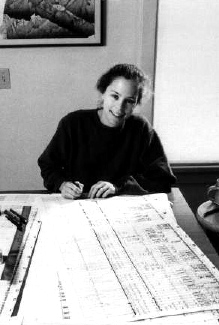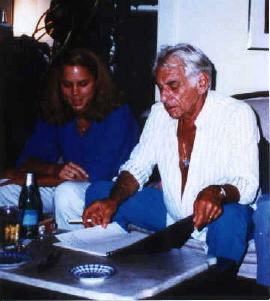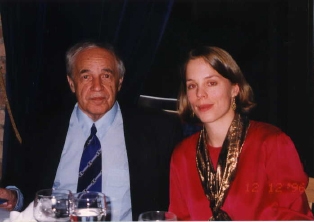
Interview from a Chicago Symphony Orchestra program booklet
Are the 1990's a good time to be a creative spirit?
When the muse strikes, it strikes and in that sense, making a piece of art is a timeless enterprise. Historically the fundamental creative process (interaction of intellect, imagination, emotion and materials) appears to have remained constant - challenging each successive generation of individuals to respond in their own distinctive way. The act of conceiving and technically executing a musical idea of substance is no easier now - if anything, it may be more difficult in the absence of a common practice.

Do you think these are difficult times for young composers?
To face a blank piece of manuscript paper is difficult for anybody at any time. The artistic process is complex and arduous. If one addresses the creative act in an honest and impassioned manner, it is quite terrifying to create music - terrifying and exhilarating!
A composer's life, now as always, is a crazy balancing act between creative intensity (and the precious time needed to devote to it) and the mundane, day-to-day activities of survival. Stretches of quiet, uninterrupted time are more valuable than anyone could imagine.
We live in a time when the arts are undervalued and underestimated by the masses. Art music, whose chief value is the quality of its thought, is overwhelmed by the bombastic rituals of pop culture and their commercial exploitation. Surely not the easiest context in which to work..... but you asked about young composers. I have to say that despite some negatives, these are positive times for talented composers in terms of professional opportunities. When one thinks of the many composers whose distinguished contributions to the art were ignored beyond their lifetimes, one should be appreciative of today's opportunities.
How do you compose? Do you sketch?
The truly creative act springs from deep necessity. That welling up, inside, of musical ideas is so urgent. The first sensation is like a spark or lightening bolt - like lighting a match - and suddenly, poof, there's an illumination, an inspiration, if you will. This glitter of energy might evoke a chord, a rhythm, a motive of a tune which I will sing and ponder in relation to structure, form, synthesis etc. From there a macro-image and plan starts to emerge and one must understand how the musical idea unfolds and where it's potential must lead.
To aid in this mysterious process, yes, I do sketch. These take several forms and fulfill several functions. One is to notate and accurately preserve decisions already made. Others may be more speculative - an exploration, a feeling-out of ideas whose role is not yet determined. Sketches help keep track of the emerging ideas when interruptions of time and mood would otherwise be disastrous. However these are not blueprints of the final music. I do not write a short score and then orchestrate. I like to compose the full sonic event and to have the entire score in front of me.
When I give the finished score to the conductor and orchestra, I rarely change much afterward. Having already gone through so many gut-wrenching revisions, I feel quite convinced about what I have made.

What would you say are the most important influences on your music?
Music itself is probably the most vital and sobering influence. By that I mean that music of many periods and by different composers has fascinated and nurtured me since I was a child. I love deeply the music of J.S. Bach for its precision, amazing invention, it's elegance and the nobility and grandeur of its emotional spectrum. The musics of Byrd, Mozart, Beethoven, Mahler, Debussy, Webern, Stravinsky and Bartok are all important to me. Also that of many contemporary composers. I listen a lot and the accomplishments of these predecessors keep me focused and humble at the same time as they inspire me with confidence to think creatively.
Literature, especially poetry, and the visual arts are also important sources of influence.
In what way does a visual artist impact your music?
Whether one composes in the aural or visual domain, qualities such as shape, density, balance, direction, transition, synthesis, integration, flux, light and dark, form are common concerns. So, I am fascinated by how a painter or sculptor handles or employs materials toward the final effect of an art object. I make analogies between the " still" world of objects and the temporal world of sound. I have never composed a work which attempts to correspond to a specific picture but I do see in the work of Klee and Picasso, for example, imaginative and creative decisions which can find correspondences in sound. Of recent poets, the work of Wallace Stevens and Louis Gluck engage me deeply.
Do you consider the audience when you're working on a composition?
The desire to make music comes from very deep inside. The urge to make and share music (communicate, if you will) is like a volcanic eruption throughout one's body. Implied in this passion to express is a recipient of the expression - someone, anyone who is a willing listener. I write music that craves a listener and believe that if one composes music that is deeply honest, personal, human and is technically and imaginatively elegant in it's articulation, it will find its audience - whoever or wherever they may be.

What do you say when asked to describe your music? Is it easy to write verbally about your work?
I'm most articulate in music and convert exactly what I am hearing to notation. There is a smooth transmission between my ear and the manuscript paper. If asked to write a paragraph about my music, it's as if there's this huge wall between what I'm thinking, what I want to say and getting it into good prose. I am not a natural writer of words. However, communicating vocally with audiences, large or small groups and teaching about music is more immediate and comfortable for me.
Remembering the adage - " music takes over where words cease" - I am aware of its truth. One can, through technical vocabulary, describe musical phenomena - but that doesn't help the curious but uninitiated. Equally unhelpful is to say "this is how it feels" since that is an attempt to describe one's own private reaction. All I can usefully say is that my music is a colorful, bold fantasy in sound, which invites any willing listener to participate in the discovery of its "meanings." I try to control logically its seductions and its aggressions; its obvious elements and its mysterious layers. I respond faithfully to my promptings and instinct and invite "the listener" to do likewise.
Part of your job here is to review new scores from different composers. Do you see any trends?
Scores are sent from around the world, from composers of all ages and backgrounds. Some are sent by publishers, others by individuals. One can categorize them in many ways but the most interesting way is based on the sound of the music itself. There are works in conservative "languages" and others in more experimental modes - and everything in between. At this stage of the twentieth century, music is many different things to many different composers and what I receive reflects that diversity. Since I enjoy the prospect of new musical experiences, I try to listen receptively and so this aspect of the residency is very natural and informative for me.
How important is it that music be accessible on first hearing?
One of the most beautiful things about music whether a Byrd Mass, a Mozart Symphony, a Beethoven quartet, a Mahler song, Stravinsky's Rite, is the element of mystery these works contain. No matter how familiar we are with them, each time we revisit Bach's Goldberg Variations or Carter's Piano Concerto or Boulez's Pli Selon Pli we can always find new qualities, experience new awareness, enjoy new pleasures of discovery. So, when you ask how important it is for music to be accessible on first hearing, I have to say that the psychology of listening is very complex. I do believe however, that all music of substance should have an immediacy about it. It should convey an aura of significance, which is different from accessibility. If it has immediacy, an impressive presence, access can follow with effort and with great reward. Instant gratification is only a small part of music's great treasure trove.
If you got everything out of it at first hearing, you wouldn't ever need to hear it again.
Well, there is great comfort in familiarity, no doubt, but the things in life which we can easily digest - that are self evident- are usually not those things we want to spend a lifetime thinking about. We are attracted to enigmatic things such as nature, gravity, the cosmos, space travel, God and religions, advanced math, myths, love etc. I believe we find such mysteries in art. We shouldn't panic - it's not all bad to be baffled!

Do you have suggestions about how to listen to new music?
Yes! Don't assume that someone else has the only "authentic" understanding of a work and that you "don't know enough about it" to be engaged by it. Simply open your heart, ears and mind and listen YOUR way.
Is it difficult to integrate new music into the standard repertoire of an orchestra?
Given a Utopian scenario - or even an historical one - the answer is no! It is the most obvious thing to do. Remember that it is only because we have accumulated a "standard repertoire" that the question even arises. For much of Western Music's history, repertoire was not a consideration - only new music was the concern. Thank God we have preserved and accumulated the treasures which constitute repertoire but this has given rise to the problem of old verses new and, in the minds of many, an equation which says old equals good therefore new equals inferior.
In short and in conclusion, let me say that music evolves - nothing in Mahler's music resembles anything in that of, say, Palestrina. It will continue to evolve but it's support mechanisms must afford it the opportunities to do so and, not withstanding the socio-economic, political and cultural dictates of contemporary reality, failure to do so will be catastrophic for music and thus for mankind.
